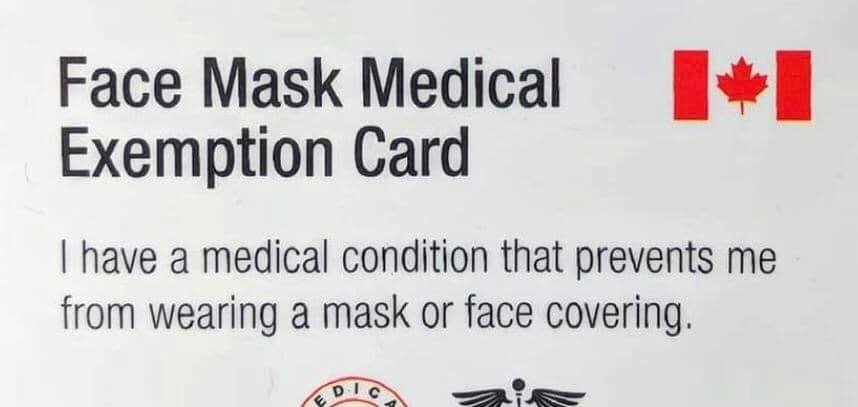Mask exception cards spark controversy
Mask exception cards are being distributed by various protest groups in Toronto, which organizers say are intended to articulate that a person can’t wear a face covering when entering a store. Yet some people are questioning the legitimacy of the cards, calling them fraudulent.
The cards, which don’t have any official legal status, say “I have a medical condition that prevents me from wearing a mask or face covering.” On the back, it states “Violation of Disability Rights, under the Canadian Human Rights Act or Canadian Charter of Rights and Freedom can be reported to” along with a phone number. The cards include several graphics, like the Canadian Flag, a red cross and a caduceus. They were made by various groups including Mothers Against Distancing and Hugs Not Masks.

The phone number displayed on the card is for the Canadian Human Rights Commission, however they say they have nothing to do with the cards.
"The Commission has not and would not produce posters or cards claiming that the cardholder has an exemption from wearing a face mask in closed public places," the spokesperson said Tuesday in an email to CTV. "We also strongly recommend to Canadians that they do not share or use these fraudulent cards."
Tony Anderson is part of The Line Canada, one of the groups distributing the cards. He says mask bylaws have exceptions for those with respiratory illnesses or other medical conditions and the cards were made as a way to make things easier for both businesses and customers.
“Instead of printing the entire bylaw and documents that say there are exceptions, businesses have approached us to find a way to open a line of communication,” he tells Yahoo Canada News. “This card is a way to open up discussion, because a lot of the businesses aren’t aware of the exceptions.”
He says that businesses are required to do their best to accommodate other disabilities, like those who are in a wheelchair, and people who can’t wear a mask need to be represented as well.
Anderson says the cards are being distributed everywhere from B.C. to P.E.I. In a Facebook post, The Free North Party wrote that 2,000 of the cards had been distributed and asked for a $5 donation, which goes to Back to Work organizations.
Some have taken to social media to criticize the cards, calling them a “misrepresentation” and “fraudulent.”
Hey Toronto!
So this anti-mask group (made up of 30 people) has been trying to hand out fraudulent medical cards.
Please report the cards if you see them. You are still in your right to not allow someone not wearing a face covering into your place of business. Please RT. pic.twitter.com/O2Vw2qUt0y— Epic Game Music (@epicgamemusic) July 13, 2020
FAKE medical mask exemption cards are circulating. Retailers Be Aware. These are NOT legit. pic.twitter.com/BDxKED0Bnb
— Andrea (@abuckley101) July 14, 2020
An anti mask group in Toronto, Canada is selling and distributing false medical cards as proof of exemption from wearing masks due to medical reasons in public places. These cards have the "logo" of the AMA, as well as, the Red Cross, Canadian Govt. Fraudulent.
— Unicorn66 (@Unicorn6610) July 12, 2020
Face mask medical exemption cards are 2020s emotional support dog.
— Naomi Harris (@mapledipped) July 14, 2020
“The Disabilities Act only requires you to provide accommodated services to someone who self identifies as needing additional help or that have a legitimate reason not to wear a mask” wrote Facebook user Derick Lehmann in a post that’s been shared over 4,000 times. “You DO NOT need to allow them entry into your business, only provide an accommodated service instead such as delivery, curbside pickup, performing the shopping for them, etc. to avoid any prosecution under the Disabilities Act.”
In the U.S., a similar card is being distributed by groups, but the Better Business Bureau is warning against purchasing them:
Dan Kelly is the president of the Canadian Federation of Independent Businesses. He says a growing number of municipalities are adopting mask or face covering bylaws, putting most of the responsibility on the business.
“I’m less concerned about whether it’s the store’s policy, because then each business can decide to accept whatever documentation people present, I’m more worried about the business being fined by the municipality for not complying with mandatory mask bylaws,” he says. “The business should not become the mask police.”
Kelly says if there is a bylaw, merchants should post a policy to advise their customers about the rules. However, it shouldn’t be on the business to be fined if someone is found not wearing a mask in a store.
“If a customer refuses to wear a mask, either because they have an exception or because they don’t want to wear one, it should be up to the merchant to refuse service or let it go,” he says. “And there should be no penalty in that instance. Merchants shouldn’t be asked to look at doctors notes to determine the legitimacy of them and then phone in to find out if this is something they just created on their computer at home.”
Kelly says there have been several instances where a business owner has tried to enforce a mask bylaw or policy that has resulted in confrontation. While he admits that some form of government-issued ID for mask exceptions would be a good thing, he says it isn’t likely given that these bylaws won’t be long-term.
The Toronto Transit Commission is providing certain customers with face mask exemption cards and buttons to use on its services for those who need them. They are available for passengers who are under two years old, those with an underlying medical condition which inhibits the ability to wear a mask or face covering, those who aren’t able to put on or take off a mask without assistance, as well as certain TTC employees.


